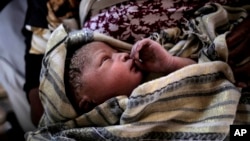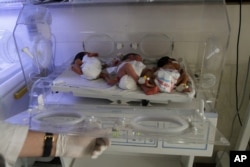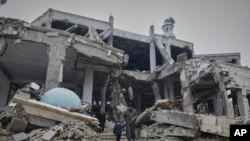ອົງການກອງທຶນເດັກ ສະຫະປະຊາຊາດ ຫລື UNICEF ລາຍງານວ່າ ພວກເດັກນ້ອຍ
ທີ່ເກີດໃໝ່ຢູ່ໃນບັນດາປະເທດທີ່ທຸກຈົນທີ່ສຸດຈຳນວນນຶ່ງ ທີ່ເປັນປະເທດ ທີ່ໄດ້ຮັບອັນ
ຕະລາຍທີ່ສຸດໃນໂລກ ແມ່ນມີເດັກນ້ອຍຊີວິດຢູ່ 50 ເທົ່າຫຼາຍກວ່າ ຢູ່ໃນບັນດາປະເທດ
ຮັ່ງມີທີສຸດ ແລະເປັນປະເທດທີ່ປອດໄພທີ່ສຸດໃນໂລກ.
ທ່ານເຮັນຣີແອັດຕາ ຟໍເຣ ຫົວໜ້າບໍລິຫານອົງການກອງທຶນເດັກ ກ່າວວ່າ ໃນຂະນະທີ່
ໄຕມາດຂອງສັດຕະວັດທີ່ຜ່ານມາໄດ້ຊີ້ໃຫ້ເຫັນການປັບປຸງທີ່ກວ້າງຂວາງໃນດ້ານສຸຂະ
ພາບພວກເດັກນ້ອຍທີ່ມີອາຍຸແກ່ກວ່າ "ພວກເຮົາກໍບໍ່ໄດ້ມີຄວາມກ້າວໜ້າທີ່ຄ້າຍຄືກັນ
ທີ່ຈະສິ້ນສຸດການເສຍຊີວິດ ລະວ່າງພວກເດັກນ້ອຍ ອາຍຸຕໍ່າກວ່ານຶ່ງເດືອນ."
“ເຖິງແມ່ນວ່າສ່ວນໃຫຍ່ຂອງການຕາຍເຫລົ່ານີ້ປ້ອງກັນໄດ້ ມັນກໍເປັນທີ່ແຈ້ງຂາວຢູ່ວ່າ
ພວກເຮົາກໍບໍ່ສາມາດທີ່ຈະຊ່ອຍພວກເດັກນ້ອຍທີ່ທຸກຈົນທີ່ສຸດຂອງໂລກໄດ້.
ການສຳຫລວດໃນ 195 ປະເທດພົບ ໄດ້ເຫັນຢ່າງໜ້າຕື່ນຕົກໃຈ ໃນອັດຕາການຕາຍ ຂອງພວກເດັກນ້ອຍທີ່ເກີດໃໝ່ຢູ່ໃນບັນດາປະເທດທຸກຈົນ ແລະຮັ່ງມີ ແລະສ່ວນໃຫຍ່
ຂອງການຕາຍເຫລົ່ານັ້ນແມ່ນເປັນເລື່ອງປ້ອງກັນໄດ້. ໂດຍສະເລ່ຍແລ້ວ ລາຍງານ
ກ່າວວ່າມີການຕາຍ 27 ຄົນ ໃນຈຳນວນ 1000 ຄົນຈາກການເກີດຢູ່ໃນປະເທດທີ່ທຸກ
ຈົນ ເມື່ອປຽບທຽບໃສ່ກັບການຕາຍ 3 ຄົນໃນຈຳນວນ 1,000 ຄົນຢູ່ໃນບັນດາປະ
ເທດທີ່ຮັ່ງມີ.
ໃນຂະນະທີ່ປະເທດປາກິສຖານຢູ່ໃນອັນດັບປະເທດທີ່ຕໍ່າສຸດໂດຍມີ ນຶ່ງໃນ 22 ຄົນ
ຂອງການຕາຍ ການສຳຫລວດໄດ້ຊີ້ໃຫ້ເຫັນວ່າແປດບ່ອນໃນຈຳນວນ 10 ບ່ອນແມ່ນ
ເປັນອັນຕະລາຍທີ່ສຸດສຳລັບການເກີດ ແມ່ນຢູ່ໃນເຂດໃຕ້ທະເລຊາຍຮາຣາ
ອາຟຣິກາ.
ຍີ່ປຸ່ນຢູ່ໃນອັນດັບສູງສຸດພຽງແຕ່ເດັກນ້ອຍເກີດໃໝ່ຄົນນຶ່ງຕາຍໃນຈຳນວນ
1,111 ຄົນ.
ໃນຈຳນວນບັນດາ 10 ປະເທດ ທີ່ມີຄວາມສ່ຽງສູງທີ່ສຸດ ແປດປະເທດຕົກຢູ່ເຂດທະ
ເລຊາຍຊາຮາຣາ ອາຟຣິກ. ເຂົາເຈົ້າແມ່ນ ສາທາລະນະລັດອາຟຣິກາກາງ ໂຊມາລີ
ເລໂຊໂທ ກີເນຍບິດໂຊ ແລະຊູດານໃຕ້ ໄອວໍຣີໂຄສ ມາລີ ແລະປະເທດແຈດ.
ແຕ່ລະປີ ພວກເດັກນ້ອຍຈຳນວນ 2 ລ້ານ 6 ແສນຄົນ ຈະບໍ່ລອດຊີວິດກາຍເດືອນ
ທຳອິດຂອງເຂົາເຈົ້າ.
The United Nations children's fund reports newborn babies in some of the poorest, most dangerous countries in the world are up to 50 times more likely to die than are newborns in some of the world's richest, safest countries.
While the last quarter-century has seen broad improvements in older children's health, "we have not made similar progress in ending deaths among children less than one month old," said Henrietta Fore, UNICEF's executive director.
"Given that the majority of these deaths are preventable, clearly we are failing the world's poorest babies."
A survey of 195 countries finds a shocking disparity in the mortality rates of newborn babies in poor and rich countries, and most of those deaths are preventable. On average, it reports 27 deaths out of 1,000 births in poor countries compared to 3 deaths out of 1,000 in rich countries.
While Pakistan is the lowest ranked country with a one in 22 chance of death, the survey notes eight of the 10 most dangerous places to be born are in sub-Saharan Africa.
Japan tops the rankings with only one newborn death out of 1,111.
Of the 10 highest-risk countries, eight are in sub-Saharan Africa. They are: the Central African Republic, Somalia, Lesotho, Guinea-Bissau and South Sudan, Ivory Coast, Mali and Chad.
Each year, some 2.6 million babies do not survive through their first month.
This month, UNICEF is launching a global campaign called "Every Child ALIVE," which aims to reduce deaths among newborn babies. UNICEF official Meg French, who heads the campaign, tells VOA there are simple, affordable measures even the poorest countries can take to bring down this unacceptably high death toll.
"We know that one of the things that would help babies the most is to be born into a safe pair of hands. So, a trained midwife, doctor or nurse. Initially you do not need big fancy hospitals. If you can get trained health workers that can get out into communities that is a really important first step."
French says other proven solutions that can prevent newborn deaths include access to clean water, disinfectants, breast feeding within the first hour of birth, skin-to-skin contact and good nutrition.
UNICEF is appealing to governments to invest in improving fragile health-care systems. It says providing facilities for mothers and newborns with water, soap and electricity will go a long way toward saving lives.











